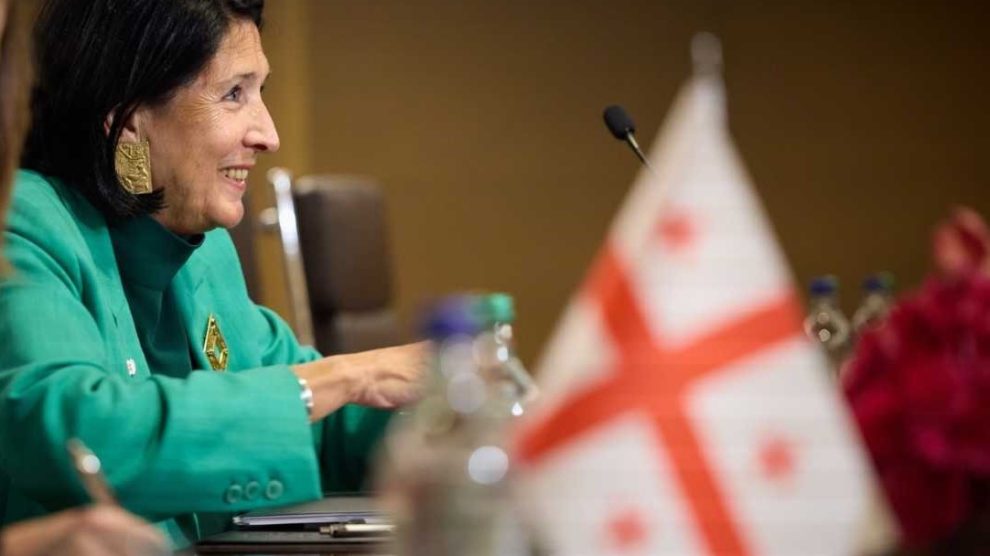Salome Zourabichvili’s presidency has been characterised by a clear vision for Georgia’s future—one that is firmly rooted in European values and democratic governance.
Georgian President Salome Zourabichvili has been named by Emerging Europe as its Public Figure of the Year, part of the organisation’s Emerging Europe Awards Programme for 2024.
Zourabichvili was chosen for the award for her unwavering commitment to democratic values, the rule of law, and Georgia’s hope of one day joining the European Union.
“As Georgia’s president, Zourabichvili’s commitment to the country’s European path—and opposition to the government’s so-called ‘Russian’ law that threatens it—has been exemplary,” says Craig Turp-Balazs, Emerging Europe’s editor.
“Countless NGOs and individuals have been inspired by her stance, which offers hope that the anti-European turn taking by the ruling Georgian Dream party is not irreversible.”
- Georgia is caught in a geopolitical tug of war
- ‘It’s never been easier to pick a side’
- Football, protests, and the emergence of New Georgia
A former French diplomat born in Paris to a Georgian family, Zourabichvili was elected to the mostly ceremonial Georgian presidency in 2018 as an independent candidate with the backing of the country’s ruling Georgian Dream party.
Although she comfortably won the presidency with more than 60 per cent of the vote, few initially greeted her victory with much enthusiasm, with many in the country’s often fractured opposition calling her a Georgian Dream stooge.
Ever since Russia launched its war on Ukraine in February 2022 however, Zourabichvili has been very publicly distancing herself from the increasingly pro-Russian Georgian Dream, so much so that in 2023, the ruling party attempted to impeach her for making what it said were “unilateral, unauthorised and unconstitutional” visits to major European capitals in order to drum up support for Georgia’s EU membership application.
The country formally applied for EU membership in February 2022. The EU offered Georgia candidate status last December while making it clear that Tbilisi needs to implement key policy recommendations for its membership bid to progress.
In April, Georgia’s Prime Minister Irakli Kobakhidze publicly denounced Zourabichvili as a “traitor” after she announced her support for the tens of thousands of Georgians protesting against a law that requires civil society organisations and print, online, and broadcast media that receive 20 per cent or more of their annual revenue—either financial support or in-kind contributions—from a “foreign power” to register with the Ministry of Justice as “organisations serving the interest of a foreign power”.
The law’s many opponents within Georgia have dubbed it ‘the Russian law’ given its similarity to legislation in Georgia’s northern neighbour, which continues to occupy some 20 per cent of Georgian territory. Many fear that the law—which has been a major setback to the country’s EU ambitions—is a further step towards realigning Georgian foreign policy with Moscow.
Zourabichvili vetoed the law, but Georgian Dream’s comfortable parliamentary majority was nevertheless able to overturn the veto. The law has been in force since August 1.
“It should be noted that Zourabichvili’s stance and activities have always followed democratic and constitutional norms – important when standing in opposition to a government that has often resorted to practices more in keeping with less democratic societies,” adds Turp-Balazs.
The warm welcome that Zourabichvili has received in the major capitals of Europe is further evidence of her endeavours to preserve Georgia’s EU ambitions,” Emerging Europe’s editor suggests. “In [Zourabichvili], Georgia has a president who leads by example and of whom they can be proud,” he says.
The Georgian Charter
As Georgia heads towards decisive parliamentary elections later this year (the election is set to be held on October 26), Zourabichvili is likely to continue to do everything within her power to ensure a level playing field so that the vote of the Georgian people will be respected.
In May, Zourabichvili brought together several (hitherto often warring) major opposition groups to sign her ‘Georgian Charter’—an agreement to support an interim government chosen by the president to push through the reforms necessary to restart Georgia’s EU membership bid after October’s parliamentary elections. One of the new government’s first acts would be repeal the so-called “Russian’ law.
Her international standing should also ensure that Georgia will receive the full support and backing of its European allies should the government attempt to override democratic norms.
Last week, on the anniversary of Russia’s 2008 invasion of Georgia, US President Joe Biden wrote to Zourabichvili to express solidarity with the country, stating that he was, “disappointed by the Georgian government’s anti-democratic actions”, exemplified by the Kremlin-style ‘foreign agents’ law and statements of Georgian Dream officials which are, he wrote, “inconsistent with EU and NATO membership norms”.
Georgia’s last elected president?
Zourabichvili’s six-year term expires at the end of the year. She is likely to be Georgia’s last popularly elected president for the foreseeable future. Under constitutional amendments adopted in 2017, the next president will be chosen by a college of 300 electors, including MPs and local officials.
The Emerging Europe Awards 2024 is the seventh edition of a programme which showcases the best of the emerging Europe region: individuals, public and private organisations as well as projects and initiatives.
Previous laureates include: Kristalina Georgieva, the managing director of the International Monetary Fund; European Public Prosecutor Laura Codruţa Kövesi; Professor Günter Verheugen, a former vice president of the European Commission; Svetlana Tikhanovskaya, leader of the democratic Belarusian opposition; and Mykhailo Fedorov, Ukraine’s deputy prime minister and minister of digital transformation.
Photo: Georgian Presidency.
Unlike many news and information platforms, Emerging Europe is free to read, and always will be. There is no paywall here. We are independent, not affiliated with nor representing any political party or business organisation. We want the very best for emerging Europe, nothing more, nothing less. Your support will help us continue to spread the word about this amazing region.
You can contribute here. Thank you.


